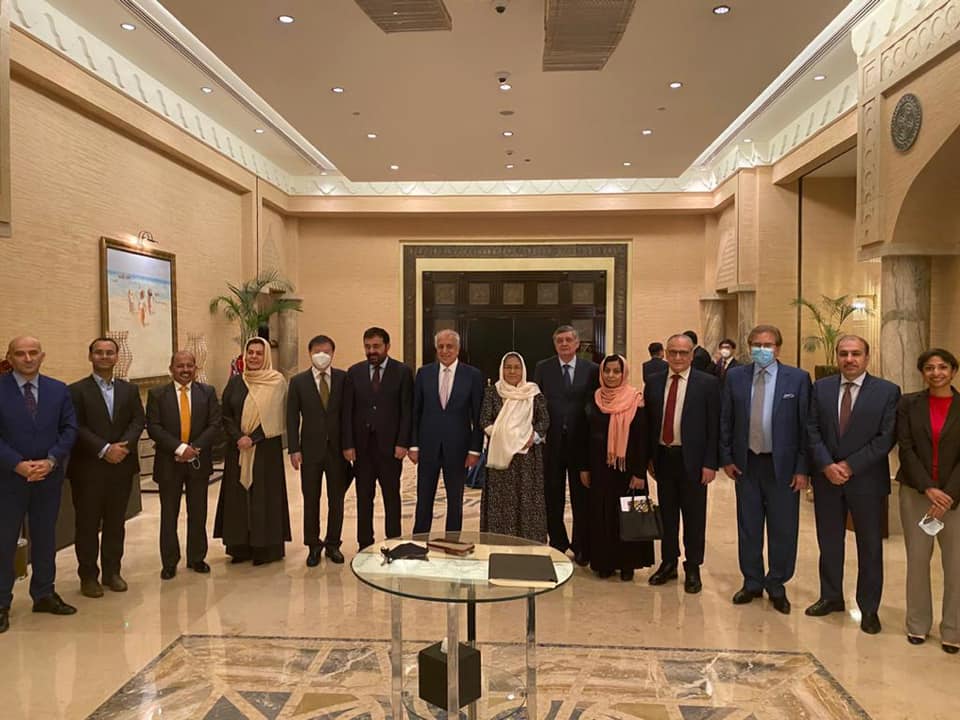On April 30, representatives of the extended “Troika,” comprising the United States, the Russian Federation, the People’s Republic of China, and the Islamic Republic of Pakistan, met in Doha, Qatar to discuss ways to support intra-Afghan negotiations and help the parties reach a negotiated settlement and a permanent and comprehensive ceasefire. The extended “Troika” met with representatives of the Islamic Republic negotiating team and of the Taliban, as well as Qatar, who graciously hosted the participants.
In the spirit of the discussions, as well as provisions of joint statements on the outcomes of previous “Troika” meetings and discussions held on March 22, April 25, July 11, and October 25, 2019; June 3 and November 30, 2020; and March 18, 2021; the four states participating in the extended “Troika” have affirmed as follows:
- We acknowledge the widespread and sincere demand of the Afghan people for a lasting and just peace and an end to the war.
- We reiterate that there is no military solution in Afghanistan and a negotiated political settlement through an Afghan-led and Afghan-owned process is the only way forward for lasting peace and stability in Afghanistan.
- We take note of the April 14 announcement by the United States and NATO that U.S./NATO forces will begin a responsible withdrawal from Afghanistan by May 1, 2021 that concludes by September 11, 2021. We reiterate that the withdrawal of foreign troops should ensure a steady transition of the situation in Afghanistan. We stress that, during the withdrawal period, the peace process should not be disrupted, no fights or turbulence shall occur in Afghanistan, and the safety of international troops should be ensured.
- We expect the Taliban to fulfill its counterterrorism commitments, including preventing terrorist groups and individuals from using Afghan soil to threaten the security of any other country; not hosting these groups and preventing them from recruiting, training, and fundraising. We expect the Afghan government to continue counterterrorism cooperation with the international community.
- We reiterate our call on all parties to the conflict in Afghanistan to reduce the level of violence in the country and on the Taliban not to pursue a Spring offensive. We condemn in the strongest terms any attacks deliberately targeting civilians in Afghanistan and call on all parties to respect their obligations under international humanitarian law in all circumstances, including those related to protection of civilians.
- We reiterate that diplomatic personnel and property shall be inviolable, and the perpetrators of any attack or threat on foreign diplomatic personnel and properties in Kabul will be held accountable.
- We urge the Government of the Islamic Republic and the High Council for National Reconciliation to engage openly with their Taliban counterparts regarding a negotiated settlement. We do not support the establishment in Afghanistan of any government imposed by force, consistent with the Joint Statement of the March 18 Expanded Troika.
- We support a review of the status of designations of Taliban individuals and entities on the UN 1988 sanctions, as stated in the UNSC resolution 2513 (2020). Practical measures to reduce violence and sustained efforts to advance intra-Afghan negotiations by the Taliban will positively affect this review process.
- We note the preparations by Turkey to host a conference of senior leaders of both Afghan parties in order to accelerate the intra-Afghan negotiations, and we also welcome the United Nations and Qatar’s roles as co-conveners of this dialogue. We call upon the negotiating parties to make progress toward an inclusive political settlement and a comprehensive and permanent ceasefire.
- We appreciate the long-standing support of the State of Qatar to facilitate the peace process, and we support the continuation of discussions between the parties’ negotiating teams in Doha.
- We welcome an expanded role for the United Nations in contributing to the Afghan peace and reconciliation process, including by leveraging its considerable experience and expertise in supporting other peace processes.
- We strongly advocate a durable and just political resolution that will result in the formation of an independent, sovereign, unified, peaceful, democratic, neutral and self-sufficient Afghanistan, free of terrorism and an illicit drug industry, which contributes to a safe environment for the voluntary, expeditious and sustainable return of Afghan refugees through a well-resourced plan; stability; and global security.
- We call on all Afghans including the Government of the Islamic Republic and the Taliban to ensure that terrorist groups and individuals do not use Afghan soil to threaten the security of any other country.
- We reaffirm that any peace agreement must include protections for the rights of all Afghans, including women, men, children, victims of war, and minorities, and should respond to the strong desire of all Afghans for economic, social and political development including the rule of law.

